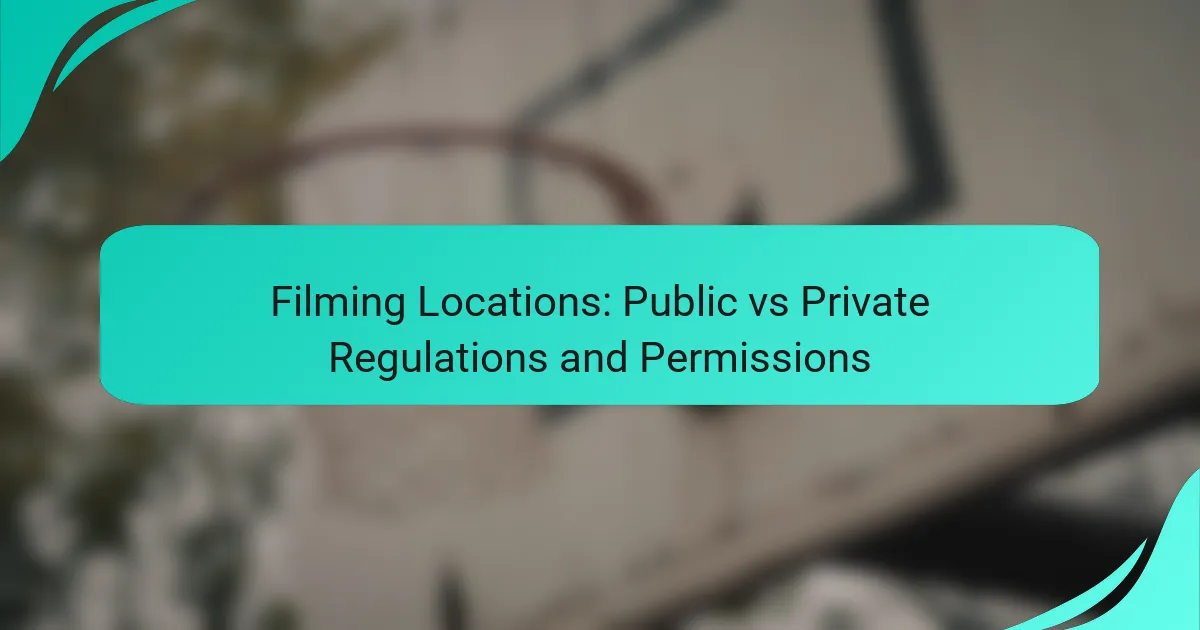Filming in various locations involves navigating a complex landscape of regulations and permissions, which differ significantly between public and private spaces. In public areas, such as those in Los Angeles, filmmakers must secure a film permit that outlines necessary compliance with local laws. Conversely, filming on private property requires explicit permission from the owner and adherence to specific municipal regulations. Understanding these requirements is crucial for a smooth filming process and to avoid potential legal issues.

What are the regulations for filming in public locations in Los Angeles?
Filming in public locations in Los Angeles requires adherence to specific regulations and obtaining the necessary permits. Generally, filmmakers must secure a film permit from the City of Los Angeles, which outlines the rules for public filming and ensures compliance with local laws.
City of Los Angeles Film Permit Requirements
To film in public areas, you must obtain a film permit from the City of Los Angeles Film Office. This process typically involves submitting an application detailing your project, including the filming dates, locations, and crew size. Depending on the scale of your production, you may need to provide additional documentation, such as proof of insurance and a traffic control plan.
For smaller projects, such as student films or low-budget productions, there may be simplified permit options available. However, all filmmakers should allow sufficient time for permit processing, which can range from a few days to several weeks, depending on the complexity of the shoot.
Public Property Filming Guidelines
It is essential to respect the rights of the public and maintain a professional demeanor during filming. Filmmakers should also be aware of potential fees associated with permits, which can vary based on the location and duration of the shoot. Always check for any special regulations that may apply to specific public spaces, such as parks or historic sites.

What are the regulations for filming in private locations in California?
Filming in private locations in California requires obtaining permission from the property owner, as well as adhering to local regulations. Each municipality may have specific rules regarding permits, insurance, and safety measures that must be followed during the filming process.
Private Property Filming Permissions
To film on private property, you must first secure explicit permission from the property owner. This often involves signing a location agreement that outlines the terms of use, including the duration of filming and any compensation. It’s advisable to start this process early, as negotiations can take time.
Property owners may have their own requirements, such as proof of insurance or a security deposit. Be prepared to discuss the nature of your project, as some owners may have restrictions based on the type of filming, such as commercial versus non-commercial projects.
Negotiating Filming Contracts with Property Owners
When negotiating contracts with property owners, clarity and transparency are key. Clearly outline the scope of your filming, including dates, times, and any specific needs like parking or equipment access. This helps build trust and ensures that both parties are on the same page.
Consider including clauses that address potential damages or disruptions to the property. It’s common for contracts to stipulate that the filmmaker is responsible for any repairs or cleaning required after filming. Always review the contract carefully and consider consulting a legal professional to ensure all terms are fair and enforceable.

How to obtain filming permits in major US cities?
To obtain filming permits in major US cities, you typically need to submit an application to the local film office or city government. This process involves providing details about your project, including location, dates, and any potential impact on public spaces.
Step-by-Step Permit Application Process
The permit application process generally starts with contacting the local film office to understand specific requirements and guidelines. Most cities require you to fill out an application form, which may include information about your production company, project details, and insurance coverage.
After submitting your application, you may need to pay a fee, which can vary widely depending on the city and the nature of your shoot. For example, fees can range from a few hundred to several thousand dollars, especially for larger productions.
Once your application is reviewed, you may be required to attend a meeting with city officials to discuss logistics, safety measures, and any necessary traffic control or public safety plans.
Common Challenges in Permit Acquisition
One common challenge in acquiring filming permits is navigating the varying regulations across different cities. Each location may have unique rules regarding noise, public access, and environmental concerns, which can complicate the approval process.
Another issue is timing; many cities require applications to be submitted weeks in advance. Delays in obtaining necessary approvals can lead to scheduling conflicts, so it’s advisable to start the process as early as possible.
Additionally, securing permits for high-demand locations, such as iconic landmarks, can be competitive. It’s beneficial to have alternative locations in mind and be flexible with your shooting schedule to increase your chances of approval.

What are the differences between public and private filming regulations?
Public filming regulations typically allow for filming in open spaces with fewer restrictions, while private filming regulations require permission from property owners and may involve more complex agreements. Understanding these differences is crucial for filmmakers to navigate the necessary permits and permissions effectively.
Key Differences in Permit Requirements
When filming in public locations, filmmakers usually need to obtain a film permit from local authorities, which can be relatively straightforward. In contrast, private locations necessitate direct negotiation with the property owner, often leading to more detailed contracts that outline usage rights, duration, and compensation.
Public permits may involve minimal fees and can often be processed quickly, sometimes within a few days. Private filming agreements, however, can require extensive discussions and may involve higher costs, depending on the property’s significance and the owner’s stipulations.
Impact of Location on Filming Permissions
The location significantly influences the ease of obtaining filming permissions. Urban areas often have established guidelines for public filming, but they may also impose restrictions due to safety, noise, or traffic concerns. Filmmakers should check local regulations to understand any limitations that might apply.
In contrast, filming on private property can vary widely based on the owner’s policies and the nature of the location. For example, a historic building may have stricter regulations due to preservation laws, while a private residence might have more flexible terms but require personal interaction with the owner. Always assess the specific context and prepare for potential negotiations.

What are the costs associated with filming permits?
Filming permits can incur various costs that depend on whether the location is public or private. Public filming permits typically involve application fees and possible location fees, while private location agreements may require negotiated rates and additional expenses.
Typical Fees for Public Filming Permits
Public filming permits often have standard fees that vary by location and the scope of the project. Generally, you can expect to pay anywhere from a few hundred to several thousand dollars, depending on the city or state regulations.
In many cases, additional costs may arise from required insurance, security personnel, or road closures. For example, major cities might charge higher fees for filming in iconic locations or during peak tourist seasons.
Costs for Private Location Filming Agreements
Private location agreements usually involve direct negotiations with property owners, leading to costs that can vary widely. Fees can range from a few hundred dollars for small, less popular venues to tens of thousands for well-known properties.
When negotiating, consider additional expenses such as cleaning fees, utilities, or any necessary modifications to the space. It’s advisable to have a clear contract outlining all costs to avoid unexpected charges during the filming process.

What are the consequences of filming without permits?
Filming without the necessary permits can lead to serious legal and financial repercussions. Unauthorized filming may result in fines, legal action, and restrictions on future filming activities.
Legal Penalties for Unauthorized Filming
Filming without a permit can incur hefty fines, often ranging from hundreds to thousands of dollars, depending on local laws. In some cases, authorities may seize equipment or halt production entirely, leading to additional costs and delays.
Legal action may also arise from property owners or local governments, which can result in lawsuits. Understanding the specific regulations in your filming location is crucial to avoid these penalties.
Impact on Future Filming Opportunities
Unauthorized filming can damage your reputation within the industry, making it difficult to secure permits for future projects. Local authorities may blacklist individuals or companies that violate filming regulations, limiting access to desirable locations.
Additionally, negative publicity from unauthorized filming can deter potential collaborators and investors. Establishing a track record of compliance with local regulations is essential for fostering positive relationships in the film community.

How do filming regulations vary by state?
Filming regulations differ significantly by state, affecting where and how productions can operate. Each state has its own set of laws regarding permits, public land usage, and private property filming, which can impact the overall production timeline and budget.
State-Specific Filming Laws Overview
Each state has unique filming laws that dictate the requirements for obtaining permits and permissions. For instance, California requires a film permit for any commercial filming on public land, while states like Texas may have more lenient regulations. Understanding these laws is crucial for filmmakers to avoid fines and ensure smooth operations.
Additionally, some states offer incentives for filmmakers, such as tax credits or rebates, which can influence the decision on where to shoot. Researching state-specific filming laws can help in planning and budgeting effectively.
Comparative Analysis of Filming Regulations
When comparing filming regulations across states, there are notable differences in the complexity and cost of obtaining permits. For example, New York City has a detailed permitting process that can take weeks, while states like Florida may offer faster approvals with fewer requirements.
Filmmakers should also consider the implications of filming on private property, as laws regarding trespassing and liability can vary. In some states, obtaining a simple location agreement may suffice, while others may require more extensive contracts and insurance coverage.

What are the best practices for navigating filming permissions?
Navigating filming permissions requires a clear understanding of both public and private regulations. Best practices include effective communication with local authorities, thorough research on location-specific rules, and timely submission of necessary applications.
Effective Communication with Local Authorities
Establishing effective communication with local authorities is crucial for obtaining filming permissions. Start by identifying the relevant agencies or departments that oversee filming in your desired location, such as city councils or film commissions.
When reaching out, be clear about your project details, including the type of filming, dates, and specific locations. Providing a concise overview helps authorities understand your needs and facilitates a smoother approval process.
Consider scheduling a meeting or phone call to discuss your project directly. This personal touch can foster goodwill and may lead to more favorable outcomes, such as expedited approvals or additional support from local resources.
